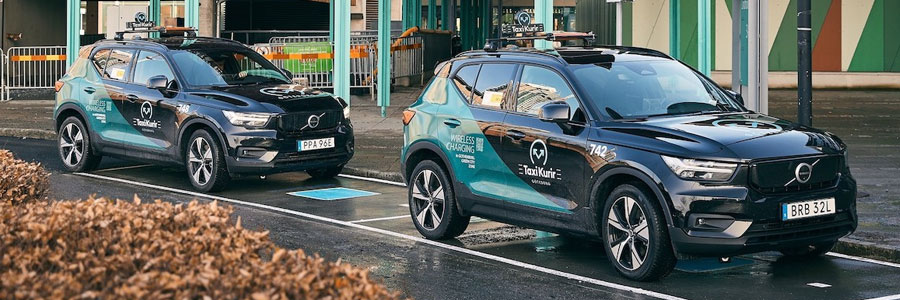Inductive charging isn't just for your smartphone

Even if you've never actually tried it, most of us are aware of the convenience of wireless charging. Whether it's a simple charging pad next to the bed, a clever stand that charges all of your devices at once, or if you're driving a newer car you might even have a wireless charging pad to keep your phone topped up already included in your car.
What you can't do with any of those is charge your electric car, and that's the part Volvo is working on right now.
Over a three-year period, a small fleet of fully electric Volvo XC40 Recharge cars will be used as taxis and charged wirelessly at stations in Gothenburg, Sweden. The wireless charging test is one of many green projects under which designated areas within the city are used as live test beds for the development of sustainable technologies.
The charging starts automatically when a compatible vehicle parks over a charging pad
These pads are embedded in the street so there's no faffing around with cables. The charging station sends energy through the charging pad, which is picked up by a receiver unit in the car. For the fully electric XC40 Recharge cars in the test, the wireless charging power will be more than 40kW, making the charging speeds around four times faster than a wired 11kW AC charger and almost as fast as a wired 50kW DC fast charger.
“Gothenburg Green City Zone lets us try exciting new technologies in a real environment and evaluate them over time for a potential future broader introduction,” said Mats Moberg, Head of Research and Development at Volvo Cars.
“Testing new charging technologies together with selected partners is a good way to evaluate alternative charging options for our future cars.”
It's not just the Scandinavians getting in on the new technology either.
While Volvo's plan is certainly a much more long-term study, the world's first trial of public EV inductive charging was carried out by char.gy in Marlow, Buckinghamshire.
Marlow trial of induction charging
The trial in Marlow was assisted by Buckinghamshire Council and offered adapted vehicles available for public hire through the hiyacar.co.uk app and website. Members of the public were invited to hire the adapted EV for periods of up to three days and provide feedback on their enhanced experience of streamlined EV charging.
Char.gy already provides lamp post charging technologies and services for urban on-street parking so installing new inductive charging on residential kerbside areas isn't such a big deal. At least not for them. In areas where charging an EV requires running an extension lead across the pavement the introduction of inductive charging points could be a major factor in encouraging more people into EVs.
Councillor Peter Strachan, Cabinet Member for Climate Change & Environment at Buckinghamshire Council, added:
“The trial of inductive charging in Marlow really provided a sense of what the near future will look like. As a typical local authority looking to incentivise the adoption of EVs, managing the street scene and accommodating a wide variety of needs and preferences on our residential roads and pavements has – until now – proven to be very challenging.
Inductive charging solves a great many of the problems and looks like a clear contender for how we organise our clean power infrastructure in the best interests of all of our residents.”
Until then, the rest of us will have to experience it with our smartphone.
View our latest blog posts

Categories
Pages
We are a family run business based in rural Worcestershire. Our team of 38 staff are on hand to provide an exceptional service to personal and business customers.
Read More
